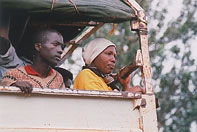|
afrol News, 14 February - The suspicion that the UN refugee agency UNHCR partcipated in a forced repatriation of Rwandan refugees thrown out from Tanzania is gaining strength. Suddenly, Rwandan refugees that had lived in Tanzanian camps are showing up in Namibia, on the other side of the subcontinent. The remaining 25,000 Rwandan refugees late last year were given two months time by Tanzanian authorities to pack their belongings and get home to Rwanda. The situation in Rwanda now was more than safe enough for a repatriation, and there was no need for refugees to keep on spending limited Tanzanian resources, the message was from Dar-es-Salaam. The Tanzanian govnerment signed an agreement with Rwanda and the UNHCR to implement a quick repatriation of the remaining refugees. Rwanda was to assure their safe reception and the UN agency was to organise registration and transports. The gigantic operation however was utterly under-financed and totally lacked of personnel to assure a proper implementation in such a short time span, several human rights groups have claimed. The Washington-based US Committee for Refugees has expressed doubts whether the repatriation of all these 25,000 Rwandans in fact had been voluntary. There clearly had been a lack of "procedures to individually screen Rwandan refugees unwilling to repatriate," the Committee concluded after screening the operation in Tanzania and Rwanda. The Tanzanian government had also had "mounted aggressive and highly controversial efforts to repatriate Rwandan refugees," the group said. The supsicions of a failure to meet the principles of a voluntary repatriation are now further confirmed by the UNHCR office in Namibia. Here, one has "confirmed an unusual influx of new Rwandan and Burundian refugees to Namibia," which had "reported to have fled camps in DR Congo [Kinshasa] and Tanzania." There is a distance of over 2,000 kilometers between Tanzania and Namibia, which do not even share a common border. No detailed information on these refugees has so far been released. UNHCR reports it is currently involved in a parallel operation in Zambia, where 5000 Rwandan refugees are to be "voluntarily repatriated" to Rwanda. The UN agency in January had signed an agreement with Zambian and Rwandan authorities. The time schedule for this repatriation is however more relaxed; this much smaller operation has been given to end of the year to fulfil its aims. The Zambian deal outlining "the voluntary return by air" of more than 5,000 Rwandan refugees was described as "an agreement that could serve as a blueprint for similar arrangements in the region," UNHCR noted in January. There are still an estimated 60,000 Rwandan refugees spread all over Africa. Most of the current Rwandan refugees left the country after the 1994 genocide, in which almost one million Tutsis and moderate Hutus were slaughtered. In 1996, Tanzania pushed for the repatriation of almost half a million Rwandans after the situation in that country had been somewhat stabilised. Many of the current refugees also left Rwanda around 2001, reacting to increased political repression in Kigali. Rwanda is now however in the middle of an intensice democratisation
process, which finally is to end "the transition period" after the 1994
genocide.Within few months, there is to be held a referendum over a nre,
democratic constitution, and shortly thereafter there will be held general
elections. Meanwhile, political rights in Kigali remain limitied.
|
front page
| news
| countries
| archive
| currencies
| news alerts login
| about afrol News
| contact
| advertise
| español
©
afrol News.
Reproducing or buying afrol News' articles.
You can contact us at mail@afrol.com

